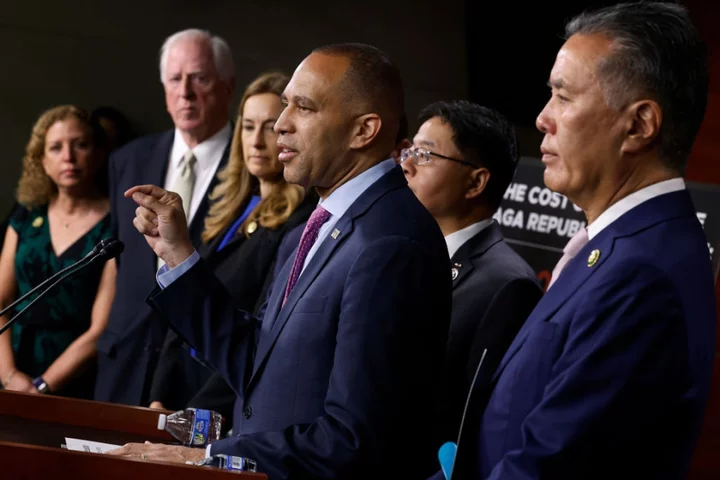
Democrats look set to back 11th hour debt ceiling deal – while GOP right-wingers threaten to blow it up
House Speaker Hakeem Jeffries sounded confident that Congress would vote to avert a default on the US’s obligations on Sunday, hours after news broke that the White House had reached a deal with Republican leadership to raise the debt ceiling. The “agreement in principle” was announced Saturday evening after much of the House of Representatives and Senate had left for the Memorial Day weekend. A handful remained in Washington to continue negotiations ahead of the deadline; the US Treasure Department estimates that the federal government’s ability to pay its debts will be in question come 1 June — this Thursday. Mr Jeffries spoke on CBS’s Face the Nation on Sunday. While he cautioned that he had not seen the actual text of the bill, which is reportedly set to cap funding for the US government (except for the military) through 2024, he offered a simple “yes” when asked directly if he could guarantee that the US would avert default. It’s a statement that will likely mean a sigh of relief for those Americans worried about the effects that a credit downgrade would have on the US economy, though that remains a possibility thanks to the toxic partisanship that brought the US to this point in the first place, but also one that may frustrate progressives and other Democrats who may see the development as Democrats giving in to the GOP’s demands. The deal does stave off further debt ceiling negotiations until 2025, but many on the left simply wish to do away with the limit altogether. And there’s already signs that many on the conservative right do not like the deal, with some even calling any legislation that raises the debt limit a non-starter. Their opposition within the GOP’s slim House majority necessitates votes from Democrats to pass this deal or any other. More follows...
2023-05-28 23:47
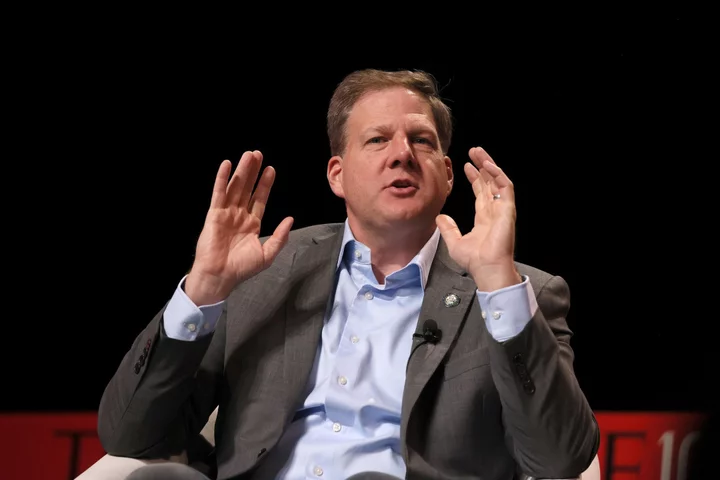
Sununu to Decide About 2024 Presidential Run in About One Week
New Hampshire Governor Chris Sununu, a persistent critic of former President Donald Trump, said he plans to decide
2023-05-28 22:57

Nvidia CEO Says Those Without AI Expertise Will Be Left Behind
Firms and individuals should familiarize themselves with artificial intelligence or risk losing out, according to Nvidia Corp. co-founder
2023-05-28 22:48

Dutch police arrest over 1,500 people at Extinction Rebellion protest in The Hague
Dutch police arrested over 1,500 people after Extinction Rebellion protesters blocked a motorway in The Hague on Saturday.
2023-05-28 22:48
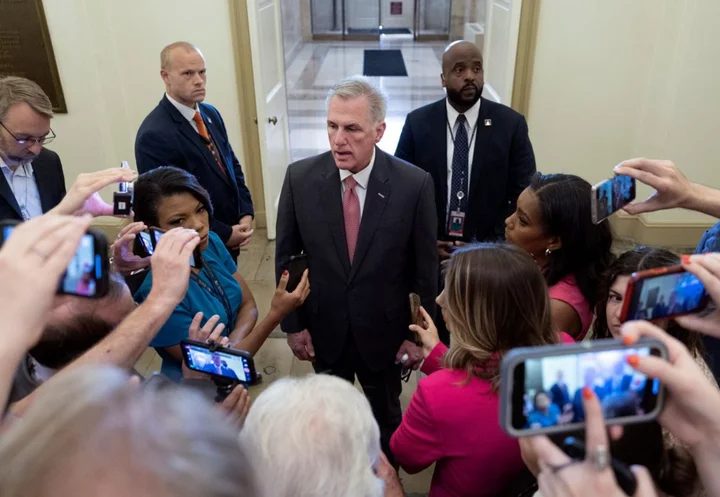
McCarthy Defends Debt Deal as ‘Right Direction’ on Spending Cuts
House Speaker Kevin McCarthy acknowledged that the debt-ceiling deal negotiated with the White House is likely to face
2023-05-28 22:29
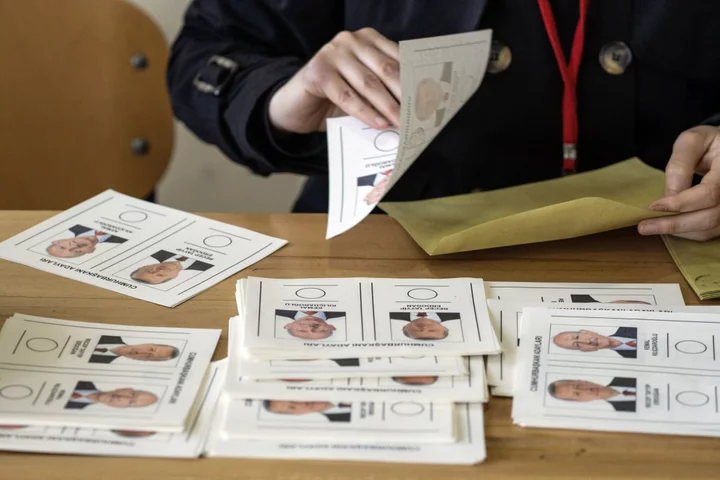
Turkey Latest: Erdogan Seeks to Extend Rule in Runoff Election
Turkish President Recep Tayyip Erdogan is vying to extend his more than two decades of rule in an
2023-05-28 22:18
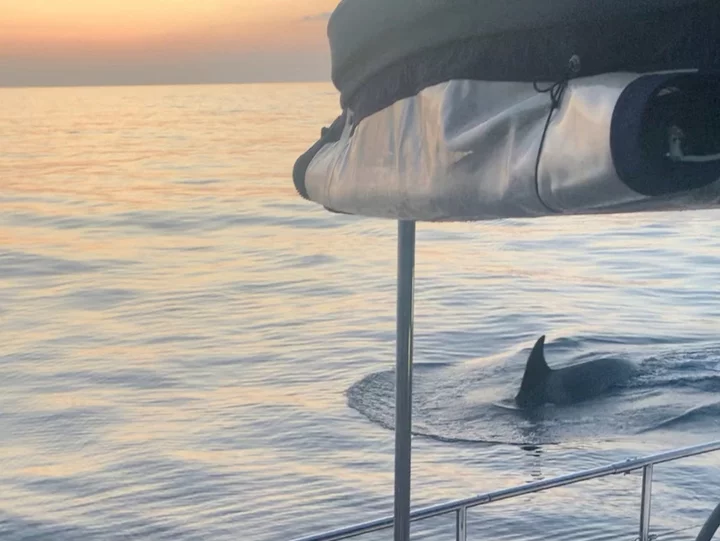
Gladis the killer whale and her gang of orcas, out for revenge on the yachts of Gibraltar
A British sailor’s boat was the latest victim in a spate of orca attacks on vessels near Gibraltar, as an expert suggested a “traumatised” killer whale may be inadvertently teaching others to target them. There have been 20 incidents this month alone between the highly social apex predators and small vessels sailing in the Strait of Gibraltar, according to the Atlantic Orca Working Group (GTOA), with dozens of orca attacks on ships recorded on Spanish and Portuguese coasts this year. In the early hours of Thursday, a group of orcas broke the rudder and pierced the hull of a boat after ramming into the Mustique on its way to Gibraltar, prompting its crew of four to contact Spanish authorities for help, a spokesperson for the maritime rescue service said. The service deployed a rapid-response vessel and a helicopter carrying a bilge pump to assist the 20-metre (66ft) vessel, which was sailing under a British flag, a spokesperson for the maritime rescue service said. The Mustique was towed to the port of Barbate, in the province of Cadiz, for repairs. Posting footage of the ordeal on Instagram, British sailor April Boyes, aged 31, said: “What started off as a seemingly unique encounter ended with orcas breaking off our rudder from the boat, then proceeding to tear bits off the boat for an hour. “A huge hole in the hull meant we had water ingress to other parts of the boat and the engine room, and I can honestly say it was a scary experience. We are all safe. I’m feeling grateful for the coastguard.” Earlier in May, the sailing yacht Alboran Champagne suffered a similar impact from three orcas half a nautical mile off Barbate. The boat could not be towed as it was completely flooded and was left adrift to sink. The boat’s captain, Werner Schaufelberger, told the German magazine Yacht that he saw the two smaller whales imitating the ramming tactic of the larger orca, believed to be a matriarch named “White Gladis”. “The little ones shook the rudder at the back while the big one repeatedly backed up and rammed the ship with full force from the side,” he said. “The two little orcas copied the bigger one’s technique and, with a slight run-up, came darting towards the boat. Mainly on the rudder, but also the keel.” Just two days previously, on 2 May, six orcas rammed the hull of a Bavaria 46 cruiser yacht in an encounter lasting an hour near Tangier, reportedly causing thousands of pounds of damage. Business consultant Janet Morris and photographer Stephen Bidwell, a couple from Cambridgeshire, both aged 58, were on board for a sailing course when they heard a shout of “orcas”. “We were sitting ducks,” Ms Morris told TheDaily Telegraph, while Mr Bidwell said: “I kept reminding myself we had a 22-tonne boat made of steel, but seeing three of them coming at once, quickly and at pace with their fins out of the water, was daunting.” “A clearly larger matriarch was definitely around and was almost supervising,” he added, speculating that it was White Gladis. The first orca encounter in the area occurred in May 2020, since when more than 500 have been recorded, according to the GTOA research group. Most interactions have been harmless, with orcas only touching an estimated one in every 100 boats passing through the area, according to biologist Alfredo Lopez Fernandez, of the GTOA and University of Aveiro, who said that three vessels have sunk so far. Experts believe White Gladis may have suffered a “critical moment of agony”, such as colliding with a boat or becoming entrapped during illegal fishing, which altered her behaviour in a “defensive” fashion. “That traumatised orca is the one that started this behaviour of physical contact with boats,” Dr Lopez Fernandez told Live Science. “We do not interpret that the orcas are teaching the young, although the behaviour has spread to the young vertically, simply by imitation, and later horizontally among them, because they consider it something important in their lives,” he said. The behaviour has baffled scientists, with some initially suggesting it could be related to the harmful scarcity of food facing the mammals, or the disruptive resumption of business-as-usual nautical activities in the wake of the pandemic, while others have suggested it could be playful behaviour. Although known as killer whales, endangered orcas are part of the dolphin family. They can measure up to eight metres and weigh up to six tonnes as adults. Additional reporting by Reuters Read More Watch killer whales wreck boat in latest violent attack off Spain Rare white orca spotted off Japanese coast for first time in two years Dolphins and orcas found to use ‘Kim Kardashian-like voice register’ to catch prey ‘Like a sledgehammer’: Killer whales perplex scientists by ramming sailing boats on Spanish coast
2023-05-28 22:16
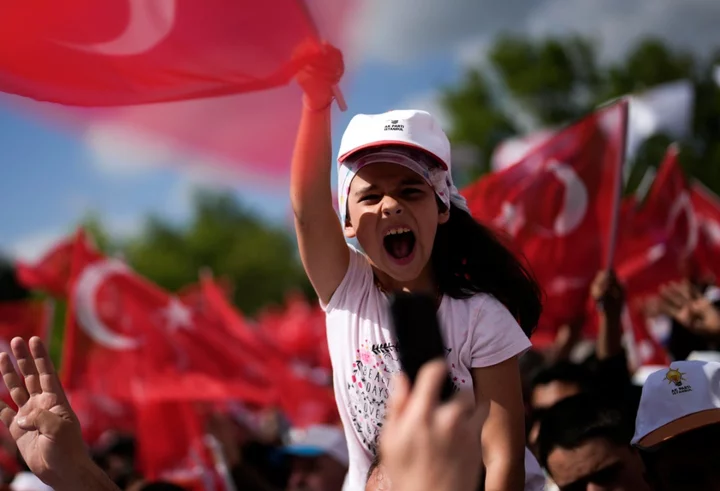
Turkey votes in an election of consequence for the nation and the world
Turkey’s President Recep Tayyip Erdogan seeks to strengthen his legacy today as his nation’s most consequential leader since its founder, Mustafa Kemal Ataturk, in an election run-off with major implications. Mr Erdogan has been campaigning frenetically in the weeks since he exceeded polling forecasts but fell shy of an outright majority in the 14 May first round of the elections, forcing Turkey into a run-off for the first time in its history. He faces off against Kemal Kilcdaroglu, leader of the centre-left People’s Republican Party (CHP) and architect of a six party opposition coalition which has posed the greatest political challenge to Mr Erdogan in his 20 years as either prime minister or president of Turkey. The election, on the centennial of Turkey’s founding as a modern republic, carries enormous weight for the country. It is seen as something of a defining moment in its political and cultural identity. Mr Erdogan represents an Islamically tinged nationalism, with appeals to Turkey’s Ottoman imperial past. Mr Kilicdaroglu and his party have sought to define themselves as European, steeped in an ideology and lineage rooted in Ataturk’s version of secularism. The election may also impact the dynamics of Nato, of which Turkey is a longtime member, and affect the outcome of the war between Russia and Ukraine as well as ongoing conflicts in the Middle East and North Africa. Lines at polling stations were reportedly shorter and more relaxed than the first round of the elections, in large part because voters face a simpler single ballot with two candidates rather than the complicated parliamentary choices of two weeks ago. Mr Erdogan appeared to be doing well in the run-up to the vote despite lingering worries over the economy he has overseen. “I think the country is doing well,” said Songul Safak, a 36-year-old jeweller who voted for Mr Erdogan. “The economy is doing badly because of the actions of other countries. In one video clip that went viral, a voter brought her pet lamb to the polls, the fluffy white creature in a striped sweater trundling behind her as she obtained and cast her ballot. Others brought their dogs and pet parrots. Turnout will be key, with more than 64 million registered voters, including nearly 2 million aboard who have already voted at record rates. Voters are heading to nearly 192,000 ballot boxes set up at school classrooms and community centres. Polls will close at 1700 local time (1400 GMT), with results trickling out an hour later. “We think that this election’s results will emerge earlier than the last time,” election authority chief Ahmet Yener told local media. There have been multiple reports of irregularities, including in an incident in the heavily contested southeastern province of Sanliurfa where opposition lawyers seeking to look into allegations of ballot stuffing were barred from a polling station. Mr Erdogan and his allies control much of the broadcast media and have been flooding the airwaves with his speeches in recent days while giving Mr Kilicdaroglu scant airtime. Turkey’s mobile phone authority recently barred the use of the country’s text-messaging services for political purposes, disallowing Mr Kilicdaroglu from sending texts to supporters while allowing Mr Erdogan to use the medium in his capacity as a government official. The country’s election laws were adjusted last year in ways critics said favoured Mr Erdogan. The Organisation for Security and Cooperation in Europe, which monitored the vote, stated in a report that Turkey’s election law “has substantial shortcomings and does not fully provide a sound legal basis for the conduct of democratic elections.” Crucial issues on voters’ minds include the status of migrants and refugees, national security matters and Turkey’s place in the world. But the country’s spiralling economy remains the top issue on everyone’s tongue and the one most impacting daily lives. The country’s inflation rate is among the highest in the world, and wages have failed to keep up with housing and food costs. “If it goes on like this Turkey will be Argentina in a few months,” Nevsin Mengu, an independent political analyst and broadcaster, said in an interview, referring to the Latin American country which has been for decades an international poster child for economic mismanagement. Mr Erdogan has dug deep into the country’s reserves and procured massive credits from Arabian Peninsula and Asian nations to prop up the Turkish lira. “Some countries from the Gulf and such stocked money in our system,” the president conceded in an interview with CNNTurk on Friday. “This relieved our central bank and market, even if for a short while." Despite his handling of the economy, Mr Erdogan’s path to victory today appears far easier and even assured compared to that of his challenger, Mr Kilicdaroglu. He drew just short of 45 per cent while Mr Erdogan fell just a few hundred thousand votes short of securing a first-round victory. Opposition figures tried to remain upbeat. “I see a very high probability of Kilicdaroglu winning the election,” opposition party leader Ali Babacan told reporters after voting. But the opposition’s poor first-round performance has demoralised its supporters. “I think the elections are not fair at all, and I think Erdogan will ultimately win,” said Zeynel Circir, a 53-year-old electrical engineer voting in Istanbul. The first-round performance prompted Mr Kilicdaroglu to shift the tone and emphasis of his campaign from a message of hope and inclusiveness to focus almost exclusively on the several million Syrian and other refugees and migrants in the country. A victory by Mr Erdogan’s will spur soul-searching and perhaps major changes within the opposition. “The ballot box result is full of messages that need to be examined and lessons that need to be learned,” Istanbul mayor Ekrem Imamoglu, a leading opposition figure, said after casting his ballot. Yusuf Sayman contributed to this report. Read More AP News Digest 8:40 a.m. Watch live: Inside Turkey’s polling stations for second round of election votes Voters in Turkey return to polls to decide on opposing presidential visions Iraq announces plans for $17 billion transportation project linking Asia to Europe Why Turkey’s presidential run-off matters for the world From ashes and debris, iconic Beirut museum reopens 3 years after massive damage from port blast
2023-05-28 21:53
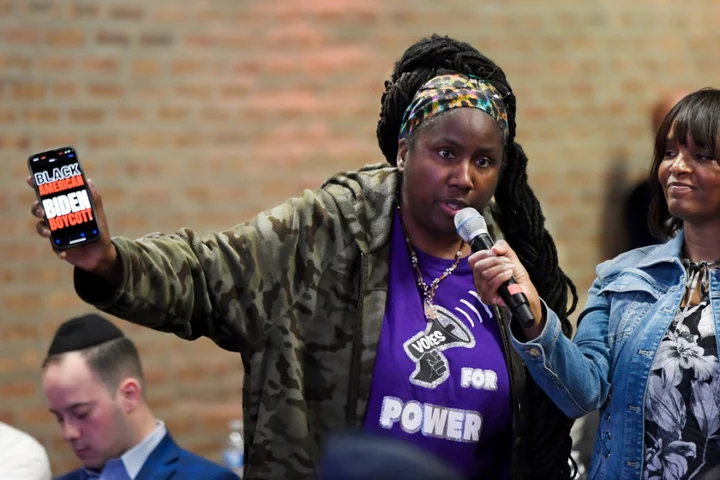
Diverse Republican presidential primary field sees an opening in 2024 with voters of color
During Donald Trump's first visit as president to Chicago, a frequent target in his attacks on urban violence, he disparaged the nation's third largest city as a haven for criminals and a national embarrassment. At a recent town hall, Republican presidential contender Vivek Ramaswamy sat alongside ex-convicts on the city's South Side and promised to defend Trump's “America First” agenda. In return, the little-known White House hopeful, a child of Indian immigrants, found a flicker of acceptance in a room full of Black and brown voters. The audience nodded when Ramaswamy said that “anti-Black racism is on the rise,” even if they took issue with his promise to eliminate affirmative action and fight “woke” policies. “America First applies to all Americans — not just the few that Republicans talk to,” he said. Race has emerged as a central issue — and a delicate one — in the 2024 presidential contest as the GOP's primary field so far features four candidates of color, making it among the most racially diverse ever. South Carolina Sen. Tim Scott, the first Black senator in the South since Reconstruction, entered the contest earlier in the month. He joined Nikki Haley, a former South Carolina governor and U.N. ambassador who is of Indian descent, and Larry Elder, an African American raised in Los Angeles' South Central neighborhood who came to national attention as a candidate in the failed effort two years ago to recall California Gov. Gavin Newsom. Miami Mayor Francis Suarez, who is of Cuban descent, says he may enter the race in the coming days. Most of the candidates of color are considered underdogs in a field currently dominated by Trump and Florida Gov. Ron DeSantis. Yet the party’s increasingly diverse leadership, backed by evolving politics on issues such as immigration, suggest the GOP may have a real opportunity in 2024 to further weaken the Democrats’ grip on African Americans and Latinos. Those groups have been among the most loyal segments of the Democratic coalition since Republican leaders fought against the Civil Rights Act of 1964. The Republican presidential contenders of 2024 walk a fine line when addressing race with the GOP’s overwhelmingly white primary electorate. In most cases, the diverse candidates in the Republican field play down the significance of their racial heritage. They all deny the existence of systemic racism in the United States even while discussing their own personal experience with racial discrimination. They oppose policies around policing, voting rights and education that are specifically designed to benefit disadvantaged communities and combat structural racism. The NAACP recently issued a travel advisory for the state of Florida under DeSantis' leadership, warning of open hostility “toward African Americans, people of color and LGBTQ+ individuals.” The notice calls out new policies enacted by the governor that include blocking public schools from teaching students about systemic racism and defunding programs aimed at diversity, equity and inclusion. The Republican presidential candidates of color largely support DeSantis' positions. Marc Morial, president and CEO of the National Urban League, said the GOP’s policies are far more important than the racial and ethnic diversity of their presidential candidates. He noted there also were four Republican candidates of color in 2016, the year Trump won the White House after exploiting tensions over race and immigration. “White nationalists, insurrectionists and white supremacists seem to find comfort in the (Republican) Party,” Morial said. “I think we’re beyond the politics of just the face of a person of color by itself appealing to people of color. What do you stand for?” With few exceptions, the Republican candidates who have entered the presidential primary field have embraced the GOP's “anti-woke” agenda, which is based on the notion that policies designed to address systemic inequities related to race, gender or sexuality are inherently unfair or even dangerous. DeSantis this past week described such policies as “cultural Marxism.” Still, the GOP's diverse field is not ignoring race. Indeed, some candidates are making their race a central theme in their appeal to Republican primary voters even as they deny that people of color face systemic challenges. Scott insisted that America is not a racist country in his recent announcement speech. “We are not defined by the color of our skin. We are defined by the content of our character. And if anyone tells you anything different, they’re lying,” he said. In her announcement video, Haley noted that she was raised in a small town in South Carolina as “the proud daughter of Indian immigrants — not black, not white, I was different.” Like Scott, she has defended the GOP against charges of racism. “Some think our ideas are not just wrong, but racist and evil," Haley said. "Nothing could be further from the truth." Elder is quick to criticize the Democrats’ “woke” agenda, Black Lives Matter and the notion of systemic racism. Critics say such messages are actually designed to win over suburban white voters more than to attract voters of color. But on the South Side of Chicago on a recent Friday afternoon, there were signs that some Black voters were open to the GOP's new messengers, given their frustration with both political parties. One attendee at Ramaswamy's town hall waved a flyer for a “Biden boycott” because the Democratic president has not signaled whether he supports reparations for the descendants of slaves, although Biden did back a congressional effort to study the issue. None of the GOP's presidential candidates supports reparations, either. Others condemned Democrats, in Chicago and in Washington, for working harder to help immigrants who are in the country illegally than struggling African American citizens. Federal officials were preparing to relocate hundreds of migrants from the U.S.-Mexico border to the South Side, even as many local residents struggled with violence and difficult economic conditions. “It is certainly true that there are multiple shades of melanin in this Republican race,” Ramaswamy said in an interview before the event. “I think that in some ways dispels the myth that much of the left will perpetuate that this is somehow you know, a racist party or whatever drivel.” He added: “But personally, I could care less what someone’s skin color is. I think what matters is, what are they going to accomplish? What’s their vision?” As of now, the GOP does not have any Hispanic candidates in the 2024 contest. But Suarez, the Miami mayor, said he may change that in the coming days. “I think it’s important the field does have candidates that can connect with and motivate Hispanics to continue a trend that's already happening,” he said in an interview, noting that he's “very strongly” considering a White House bid. “Democrats have failed miserably to connect with Hispanics." A majority of Latino voters supported Biden in the 2020 presidential contest, according to AP VoteCast, an extensive national survey of the electorate. But Trump cut into that support in some competitive states, including Florida and Nevada, revealing important shifts among Latinos from many different cultural backgrounds. In last fall's midterm elections, support grew for Republican candidates among Black voters, although they remained overwhelmingly supportive of Democrats, AP Votecast found. Overall, Republican candidates were backed by 14% of Black voters, compared with 8% in the midterm elections four years earlier. While the shifts may be relatively small, strategists in both parties acknowledge that any shift is significant given how close some elections may be in 2024. In Chicago, Tyrone Muhammad, who leads Ex-Cons for Social Change, lashed out at Republicans for being “losers” for not seizing a very real opportunity to win over more African Americans. While sitting next to Ramaswamy on stage, he also declared that the Republican Party is racist. Later, he said he actually voted for Trump in 2020 because Trump enacted a criminal justice bill that aimed to shorten prison sentences for nonviolent drug offenders and address racial inequalities in the justice system. While the GOP has since embraced tough-on-crime rhetoric, Muhammed noted that Biden as a senator helped pass the 1994 crime bill that led to the mass incarceration of Black people. Muhammad said he might vote Republican again in 2024, despite the party's shortcomings. He pointed to the GOP's fight against illegal immigration as a core reason for support. “I may not like you as an individual, but I like your issues, I like your policies," he said. ___ Fields reported from Washington. Associated Press writer Thomas Beaumont in Des Moines, Iowa, contributed to this report. ___ The Associated Press receives support from several private foundations to enhance its explanatory coverage of elections and democracy. See more about AP’s democracy initiative here. The AP is solely responsible for all content. Read More Ukraine war’s heaviest fight rages in east - follow live Charity boss speaks out over ‘traumatic’ encounter with royal aide AP News Digest 8:40 a.m. Asylum-seekers say joy over end of Title 42 turns to anguish induced by new US rules Why Texas Attorney General Ken Paxton's impeachment fight isn't finished yet
2023-05-28 21:29
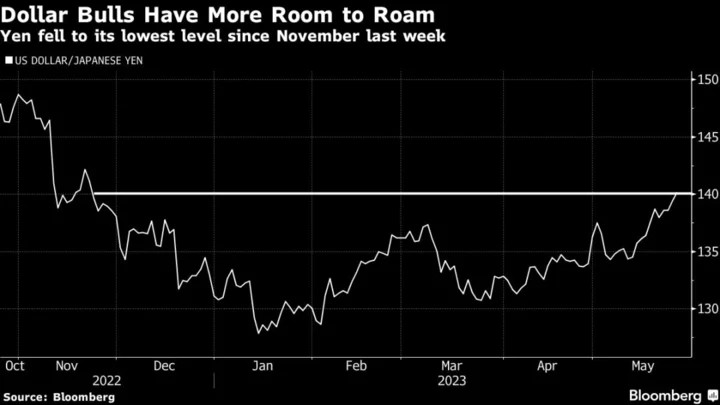
Traders Gear Up to Embrace Riskier Assets After Debt-Cap Deal
Global markets are primed for a relief rally after US negotiators agreed to a tentative deal over the
2023-05-28 20:20
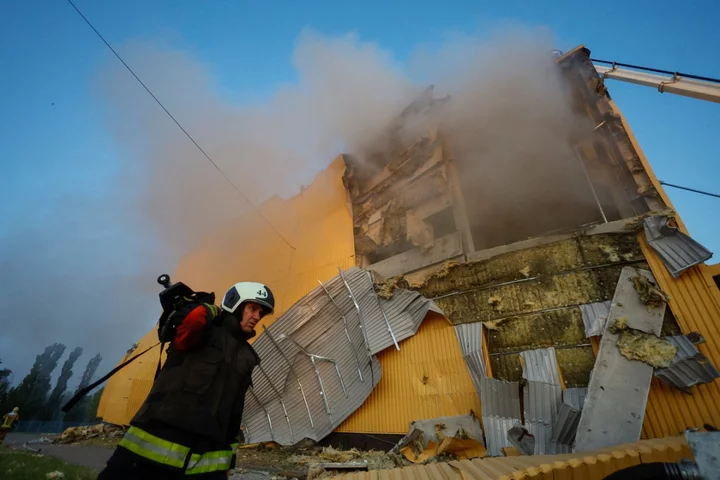
Ukraine-Russia war – latest: Ambassador warns Putin not acting ‘seriously’ yet in Ukraine
The Russian ambassador to the UK Andrei Kelin has claimed that Russia has not yet started acting “seriously” in Ukraine. In an interview on the BBC’s Kuenssberg show, Kelin said Russia is “yet to act very seriously” in Ukraine, and warned Russia has “enormous resources” to fight. Ambassador Kelin also warned of a “new dimension” in the Russia-Ukraine war. He said: “It is a big idealistic mistake to think that Ukraine will prevail. Russia is 16 times bigger than Ukraine. We have enormous resources and we haven’t just started yet to act very seriously. “We are just defending the lands which are under control and assisting Russian people over there. We are rebuilding the Donbas. “It depends on the escalation of war that is taking place. Sooner or later this escalation might have a new dimension that we do not need and we do not want. We can make peace tomorrow, if Ukrainian side will be prepared to negotiate but there is no preconditions for that.” Ambassador Kelin’s claims of “enormous resources” come after reports that Russian forces on the ground are poorly equipped and without proper training. Read More Russia has started deploying tactical nuclear warheads to Belarus, says Lukashenko As the Ukraine war spills into Russia, a dangerous new front is about to explode The Russians out for revenge on Putin Roger Waters ‘dresses as SS officer’ and projects Anne Frank’s name onto stage during gigs in Germany
2023-05-28 17:47
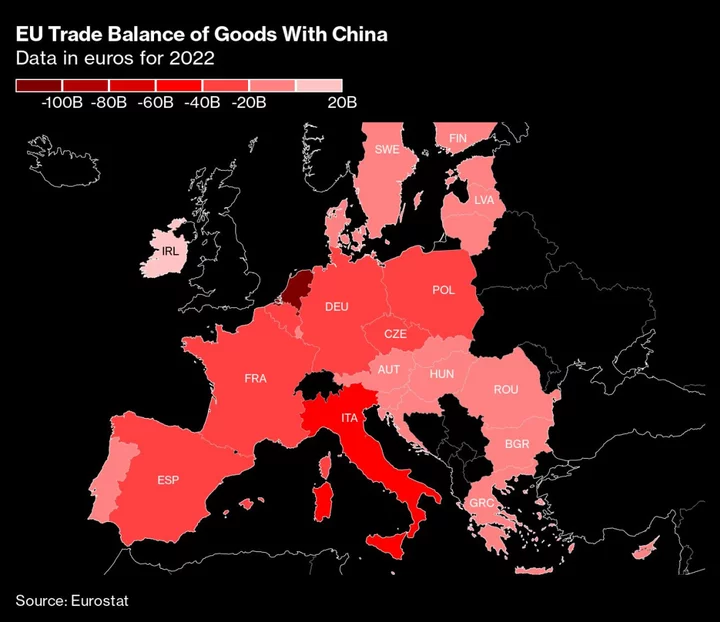
Italy Still Mulling Whether to Pull Out of China Pact: Meloni
Prime Minister Giorgia Meloni has yet to make a final decision on Italy’s controversial role in China’s Belt
2023-05-28 17:26
